Geothermal
Are you tired of paying high gas or propane bills? We can save you 50% to 80% or more in energy costs for your home.
The Government will help too with a tax credit!
 30% tax credit for homeowners who install geothermal heat pump systems in 2009 and later years. For systems placed in service in 2008, the $2,000 lilmit still applies So, for example, if a homeowner pays $15,000 for a geothermal heat pump system installed in 2009, a tax credit of $4,500 could apply.
30% tax credit for homeowners who install geothermal heat pump systems in 2009 and later years. For systems placed in service in 2008, the $2,000 lilmit still applies So, for example, if a homeowner pays $15,000 for a geothermal heat pump system installed in 2009, a tax credit of $4,500 could apply.
Use IRS Form 5695 for the Residential Energy Efficient Property Credit to claim the tax credit for Energy Star geothermal heat pumps. You can view and download the form at the following link: http://www.irs.gov/pub/irs-pdf/f5695.pdf Line 18 on the form is where you enter “Qualified geothermal heat pump property costs”, and Line 19 is where you multiply costs by 30%.
Contact us for details.
GeoThermal Heat Pumps Save Money
For every watt of electricity that is used a heat pump can deliver 2 to 4 watts of heat to hour home. A geothermal heat pump typically delivers 4 watts because it gets the heat from the earth instead of the air. One watt of energy consumed plus three watts from the earth equals four watts of heat delivered to your home. The sun warms the earth. Geothermal heat pump tubing is placed in the earth where the temperature is approximately 50 degrees.
A geothermal heat pump can also make water hot enough to heat your home with in-floor radiant heat. (See Radiant Heat)
Common legend in Chicago is that heat pumps do not work in this area. Heat pumps are good for southern states but they do not work in northern areas.
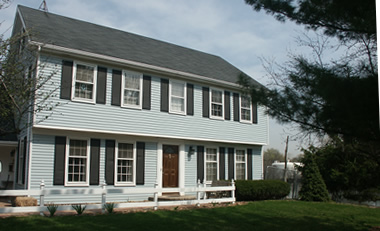
Home in Wheaton, IL

Home in Northbrook, IL
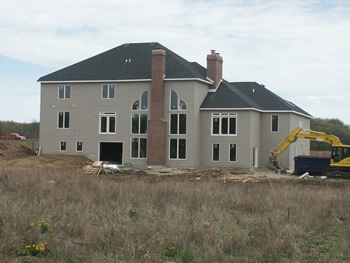
New construction in Marango, IL
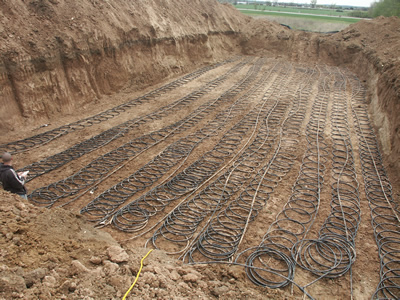
Horizontal Loop Field
Let me tell you my story.I received my electric bill for the month of January 2004 and it was $238.00 and that includes hot water, a clothes dryer, cooking, lights, and heating and taxes. The house is a 2000 square foot ranch and has 285 square feet of un-insulated basement area that is heated with electric heaters.
The old heat pump was installed in June of 1978 and operated until December of 2003. It operated for 25 years and 6 months and there were6 minor repairs that were made to the unit. The new heat pump has a SEER rating of 12.
In talking to friends that use natural gas, the energy cost with an electric heat pump is quite competitive. Based on current trends the price of natural gas may continue to go up and it may be considerably less expensive to operate a heat pump in Chicago.
If you use propane for heating your home the savings by going to a heat pump is dramatic.
The price of fossil fuels is rising and it appears that this is not just a short-term problem. Natural gas, propane, and fuel oil are likely to increase in price in the future. Electric has the advantage of being generated from a variety of sources. Electricity can be generated from the sun, wind, water, nuclear, coal and other forms of energy. This fact means that electricity has the best chance of being a stable energy source for heating your home. The only other energy source that is less expensive for heating your home is solar energy. Solar energy can not cool your home and the Chicago area has a lot of cloudy days in the winter.
If you are thinking of installing a new air conditioner you may want to think about installing a heat pump instead. It will cool your home in the summer and furnish approximately 70% to 80% of the heat that you need in the winter.
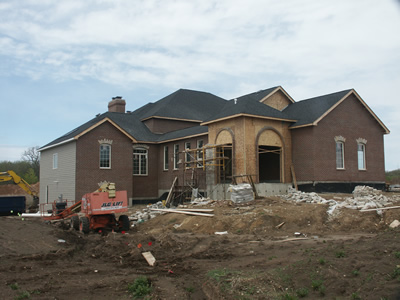

___________________________________________________
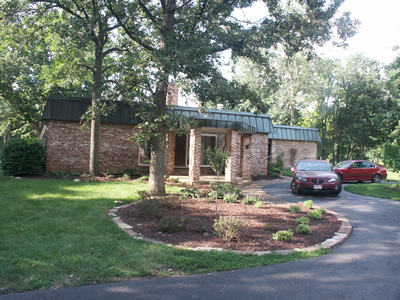
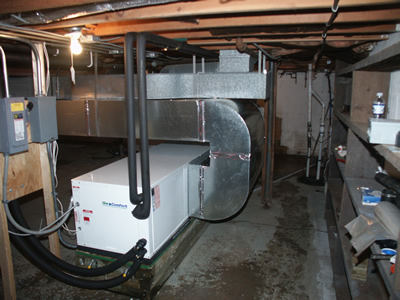
Unit installed in above home
It seems to us that having two sources of energy to heat with is not a bad idea. We can do the calculations to see if it makes sense for you to consider a heat pump instead of an air conditioner.
In conclusion heat pumps work well in Chicago, repairs are minimal, and they are more economical to operate than a gas furnaces.
Another advantage is that since heat pumps are sized differently than gas furnaces they run longer and you will have more even temperatures throughout the home.
One disadvantage is that the air coming out of the registers is between 100 and 110 degrees F., and some people feel that the heat is more drafty. The air temperature coming out of the registers for gas furnaces is generally between 120 to 140 degrees F. Placement of registers is more important than with a gas furnace. Also there should be enough registers so that the air comes out of the registers gently instead of blowing hard,especially if the furniture is placed so that people would be near a register.
Another disadvantage is that you need to find a service company that knows how to install and service heat pumps so that you will have efficient, reliable service from the heat pump.
We know how to install and service both air and geothermal heat pumps!
View the video of one of the manufacturers we recommend, Climatemaster:

Another manufacturer we recommend is:
Please contact us for more information.

